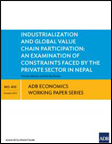Harmonizing Electricity Laws in South AsiaMany in South Asia face electricity shortages that affect their socioeconomic development. But the region has a large hydropower potential and other energy resources that may be harnessed to drive growth in the region. This report looks at legal, regulatory, technical, and commercial requirements for energy trade to advance in the region, and gives recommendations for implementing the South Asian Association for Regional Cooperation Framework Agreement on Energy Trade. Author: Asian Development Bank and the South Asian Association for Regional Cooperation in Law Year: 2017 Download Tags: Bangladesh, Bhutan, Energy, Harmonisation, India, Industrialization, Maldives, Nepal, Regional Cooperation, South Asia, Sri Lanka, Trade, ADB RCI Lessons for South Asia from the Industrial Cluster Development Experience of the Republic of KoreaGrowth of manufacturing is crucial for economic growth and poverty reduction. This report highlights the industrial cluster development policy of the Republic of Korea, including its success factors in terms of policy implementation, and the promotion of industrial cluster development, drawing lessons that could enhance industrial growth in South Asia. It discusses how the government encouraged increase in exports through relevant policies and adapted to more technology- and knowledge-intensive industries which required innovation-driven policies. The experience outlined in the report could benefit large-scale industrial promotion in South Asia, such as the Economic Corridor Program in India. Author: Jong-il Kim Year: 2015 Download Tags: South Asia, Industrialization, Economic Corridor, Trade, ADB, India, Bangladesh, Sri Lanka, ADB RCI  Industrialization and Global Value Chain Participation: An Examination of Constraints Faced by the Private Sector in NepalThis paper examines the constraints behind and beyond Nepal's borders that hinder its full participation in global value chains (GVC). Basing the analysis on recent and relevant publications, key economic data, and interviews with policymakers and stakeholders, the authors explain how weak and uncertain industrial policy has led to de-industrialization. They also looked at the effects of inadequate infrastructure, energy shortage, and inefficient transit. Failures in coordination, shallow regional integration and non-tariff barriers also bar further growth of Nepal's industrial development and GVC participation. The authors recommend necessary domestic reforms for behind-the-border constraints, and subregional partnerships—facilitated through the South Asia Subregional Economic Cooperation program—for beyond-the-border challenges. Author: Yurendra Basnett and Posh Raj Pandey Year: 2014 Download Tags: Infrastructure, Private Sector, Nepal, Global Value Chains, Industrialization, Infrastructure, Energy, Transport, Regional Integration, SASEC SAARC Biz: The Inevitability of South Asia SAARC Biz is a monthly publication of the SAARC Chamber of Commerce & Industry and features a report on the 'Inevitability of South Asia'. While the term 'South Asia' is commonly accepted, it argues that regionalism is far from being implemented on the ground. For instance, SAARC was accepted as a concept of cross-border regionalism but was hobbled due to budget constraints and restrictive mandates. Connectivity across national frontiers is needed to jump-start regionalism and improve lives in the most deprived parts of the Subcontinent. Author: SAARC Chamber of Commerce and Industry Year: 2014 Download Tags: South Asia, Regional Cooperation, SAARC, Industrialization, Regional Integration, Poverty Reduction, Gender, Least Developed Countries, Connectivity, Agriculture, Bangladesh, Youth, India, Environment, Investment, Tourism, Renewables |



